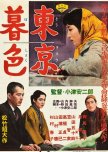
Quality relationships are the biggest impact on happiness
Tokyo Twilight (1957) was Ozu's last film in black and white. It is a family drama and is regarded as one of Ozu's darkest films. This is a film worth watching if you've already seen a few Ozu films and want to be 'completist' in your Ozu viewing. Otherwise, as a stand alone film selection, I don't recommend it for most folks.Considering the seasonal themes of many Ozu films, Tokyo Twilight features snow, so we are firmly in the season of Winter.
The issue for me, isn't so much the dark themes and plot outcomes, but rather having difficulty accepting Akiko - the distraught daughter who seems to have no luck in life. In some ways, I felt the character's presentation wasn't believable and, as a result, had difficulty empathizing with this character. The two Ozu films that I've seen the actress, Arima Ineko, star in, I was irritated with her characters including Akiko. Ms. Arima's characters present overwhelmingly as stubborn, impatient, and lacking in social skill and regard for others. Perhaps that was intended by Ozu, or perhaps, it was overacted to some extent. In any event, the filmgoer is supposed to feel for Akiko, who has no close relationships to lean on for true support.
Setsuko Hara, on the other hand, plays the depressed older sister role of Takako. She was terrific to watch in this film, and I gained a greater appreciation of her skills after being accustomed to her bubbly, smiling, 'pure' daughter roles in other Ozu films. The subtle sorrow that Ms. Hara projects in Tokyo Twilight is convincing and masterful.
Ozu films can, as an overall style or scheme, be not too explicit about plot. There are ellipses or gaps in the plot. This leaves some of the story plot or character feelings open to interpretation. For many Ozu films, this works well; viewers intuit characters' thoughts and feelings because they're so real and relatable that we don't need image or word to confirm what's going on. However, in Tokyo Twilight, these gaps in plot are more confusing, on average, than other films. It might take some 'studying' after watching the film to come to a full understanding of the plot and themes. I suspect many viewers are not willing to do that, which is why I, again, only recommend this film for the Ozu 'completist'.
Was this review helpful to you?
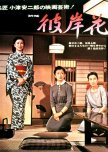
Exploring the gap between Parent and Child
Equinox flower (1958) was Ozu's 48th film (of 53) and his first feature film in color. As with all Ozu films, Equinox Flower is a family drama.This film focuses on an upper middle class family in conflict; that is the daughter's decision to choose a marriage partner without consulting parents and a parent's view they should be involved in the decision. It might seem filmgoers would automatically side with the daughter in this story, but many will sympathize with the old-fashioned father to a certain extent. If this topic interests you, do watch the film and be aware of your perceptions, thoughts, feelings, and judgments.
One side note, is that the title, "Equinox flower", is also the common name of an Asian lily - Lycoris radiata; it is also called 'red spider lily', 'red magic lily', and 'corpse flower'. It is a beautiful red flower (look it up online!). This flower blooms in August-September, close to the Autumn Equinox. The flower has some cultural relevance to death. Consider what element(s) of the film may symbolically link to this flower. Does it represent the decay/death of a parent-child relationship when the child marries and becomes 'independent' from parent?
This film primarily explores the gap or 'conflicts' in perception that parents and children have of one another. The following 2 script selections represent that gap.
Says one Mother to another mother:
I'm doing all I can,
but Yukiko (the speaker's adult daughter) just keeps telling me
to leave her alone and not bother her.
Children are so ungrateful.
Our children are the same.
It must be the same everywhere.
Says one adult daughter to another adult daughter (--):
I envy you, Setsuko.
Your parents aren't like my mother.
They're so understanding.
--I wouldn't be so sure of that.
They're not like Mom at all.
She always goes on and on
and never gets to the point.
--She has an interesting way of talking.
Yeah, too interesting, if you ask me.
Setsuko, we should team up.
--What do you mean?
You help me
when my mother's being unreasonable,
and I'll do the same for you.
Was this review helpful to you?
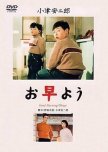
Ozu's most accessible film; a great first film to start with
Yasujiro Ozu, along with his writing buddy, Kogo Noda, collaborated on 27 films. Ozu, alone, made 53 feature films. Good Morning was Ozu's 49th film, and 2nd film in color. This is one of his 'later' films.Good Morning (1959) is easily one of the most accessible films for the new Ozu filmgoer. It is in audio, color, and, at 94 min. run time, very digestible. Compared to other Ozu films, it feels less 'heavy', quicker in pace, and is visually stimulating; older Ozu films (especially the black and white films) have a more static visual presentation. There's lots of explicit and implicit comedy in Good Morning, and the music is more 'modern' compared to earlier films. Furthermore, Good Morning leans heavily on the performance of children, including a cute young child who does an incredible acting job. There's something to like in this film for everyone. This is a fine film to watch for a family with children.
As with all Ozu films, this is a family drama. The plot and themes cover the dynamics of an upper middle class household (father, mother and their two young sons). The film also explores the dynamics of neighborhood relations and intergenerational dynamics. The challenges of raising children are explored as are the differences in socioeconomic statuses of neighbors. Compared to many other Ozu films, which focus on adult characters, Good Morning features well-developed children characters. The children actors in this film, in fact, steal the show.
The portrayal of happy-go-lucky children in Good morning, may be a symbolic decision. In 1959, Japan would have had young children (age 1-15) with little to no living memory of WWII. Instead, the children of Good Morning are concerned with television, watching sumo and baseball, and having fun with friends. The adult parents, conversely, are consumed with work and rebuilding the nation from its WWII defeat; they seem too busy to be strict with their children for long, giving in to demands for consumer pleasures.
While this film may not be as 'emotional' or as 'deep' as other Ozu films, it is still a very thought provoking film. For myself, personally, this film made me want to read more about Japan's modern history.
Good morning is a very good place to start for the first-time Ozu filmgoer and is appropriate for children of middle-school reading ability.
Was this review helpful to you?
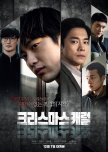
Love all cast are men
I am impressed that the all cast are men because it shows that also men can be a victim.I am amazed also that the characters show different types of men in this movie.
I wish that I can find a movie like this, something similar to this genre.
All I can say is great great great great great great great great great great great great great great great great great great great great great great great great great great great great great great great great great great great great great great great great great great
Was this review helpful to you?

definitely more of a comedy than a horror
This movie is really goofy from like the minute it starts all the way until the end credits scenes. It made me laugh so many times; there's really funny physical humor, lots of great one-liners, the makeup in several scenes made me giggle, and the actors were just amazing with pulling off fear and hilarity. Honestly, with the story, I could guess a lot of it (tho admittedly the Truth of it all did surprise me) which isn't a bad thing, but I think with a different cast it would've been a lot more boring. The three boys as well as the grandparents and "Little Suzuki" were perfect in their roles.The music was fine, I didn't really feel that moved by it either to laughter or anything else. Another criticism I had is that sometimes the really emotional scenes feel out of left field, or aren't given more than a few seconds to hit before it was already moving on. I enjoyed anyway, but I did notice it and it was a little distracting. Also, while I am queer and a lot of the gay jokes were funny, I wish it could've been handled maybe a little differently. Idk I have mixed feelings about that aspect.
General rewatch value is probably higher than I rated it for myself, because once you know the ending it would def be fun to look back and see all the hints. But personally idk if I'll be rewatching, at least not any time soon. Maybe when I need a pick me up.
Worth a watch for sure, but don't go into this expecting a horror--you will only find a comedy.
Was this review helpful to you?

This review may contain spoilers
Despite Michelle Yeoh's best efforts, this stunt fell flat
The Stunt Woman starring Michelle Yeoh started out strong giving the audience a behind the scenes look at the grueling and dangerous life of stunt women and men. Then it lost its way and stumbled down a confusing path that not even the graceful Yeoh could save it from.Michelle played Ah Kam, a stunt woman who through determination finds a job working for Master Tung's (Sammo Hung) stunt company. She quickly becomes one of the stunt family after showing her fearlessness and skill. Paco Yick and Mang Hoi, real life stuntmen and stunt directors, were part of Tung's crew. The film touched on the Triads who were involved with movie making during this time. If the film had stayed focused on the nomadic and precarious life of the stuntmen in Hong Kong, especially before CGI and improved safety conditions, this could have been a fascinating story. Instead, Ah Kam falls in love and becomes a manager of her lover's Karaoke bar. When this falls apart she heads back to her true love, working in the movies. Tragedy awaits her and the crew. The next thing you know she's playing surrogate mother to Tung's wild child son.
Perhaps parts of the story had to be re-written after Michelle suffered a calamitous fall, injuring her back. They actually showed footage of her jump from a bridge onto a truck and her having to be tenderly carried off afterwards, which paramedics should probably have been doing. Or maybe director Ann Hui was trying to show three different traditional eras in a woman's life-singlehood, being a couple, being a mom. Whatever the motivation, the story was all over the place in the second and third acts. A major death happened practically off screen, losing much of the emotional impact. Some story elements were vague at best, others were simply dropped.
Michelle Yeoh did her best with what they gave her as did Sammo Hung. They had a nice professional chemistry together. It was fun to see numerous stuntmen have the chance to show their skills as real characters. Kent Cheng and Richard Ng made guest appearances rounding out the cast nicely. The only drawback in the acting department was the child character. Ah Long was a thoroughly unlikeable kid who only partially redeemed himself.
There were a few fight scenes, but much like some of the stunts, they were filmed from a distance or too close, making the action blurry. With Yeoh and the stunt crew, it seemed as if there should have been much better, clearer shots for us to enjoy.
The movie started out strong and ended with a whimper, a terrible waste of kung fu legendary talent. The film did cause Michelle Yeoh to reconsider some of her movie choices which led to a James Bond film and Crouching Tiger, Hidden Dragon which helped to cement her status internationally. So in the end, this uneven film was useful after all.
2/21/23
Was this review helpful to you?

a boring psa of the dangers of technology
i did not hate unlocked (2023) but i was definitely bored. the whole plot is a little too on the nose for me and even reinstates this message quite a few times throughout the movie.while the movie fell flat for me, two things stood out- the production quality and si wan's performance. the opening sequence is mwah so beautiful. i really enjoyed a lot of the cinematography and how some of the shots and blocking are pretty dynamic. si wan is GREAT here. if only the story was there to back him up.
the first hour is better in terms of pacing and story than the last hour, but si wan appears more in the last. maybe you can watch this movie in the background but don't make it a priority.
Was this review helpful to you?
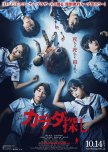
This review may contain spoilers
One of those horror movie which characters do stupid things
The ending omg!At least 1 death could have been avoided if the main girl just run and put the head back when the guy gave her. Then she has a second chance to again quickly put the head again, but noo. She rather cry and do all of this slo mo and the guy ended up being eaten by the monster, all his pain could have been avoided.
The monster is so strong yet can be beaten by the main girl while the boys were struggling to get a hold of it. Like what ?
I'm so mad I wasted my time watching this.
Was this review helpful to you?

This review may contain spoilers
The nasty & rude brother's intrusion to a couple's happy and peaceful life.
That was short—freaking short! It could honestly run for another 20 mins or two and I would never ever mind. It was a cliffhanger in the most annoying way possible, I would say. I almost didn't even enjoy that... It felt like I brush my teeth longer than this extremely-short film.Anyways, I still wanna say that I enjoyed this short film a lot. I find it really amusing how K-BL industry is now more open when it comes to providing us with this level of interactions and intimacy.
Kissing Scenes was surprisingly intense... something I didn't really expect at first. Although I've known that the past few years has really brought great changes to the industry; but I kind of still wasn't expecting this to be at 'that' level.
Nonetheless, I'm still highly satisfied on this short-project and I'm also hoping to get an extended version of it somehow.
P.S. I'm really curious whether the brother got a hint already of their relationship. Cause I'm sure as hell he already did.
Story - 9.5, Nothing was actually bad about this. Aside from the fact that it was agonizingly short. This would've been perfect if it was really a bit longer. Gosh!
Acting/Cast - 9.5, Kim Jaeheung did really great. Like there's no hint of any awkwardness shown throughout his portrayal. Park Jongho on the otherhand felt a bit unstable and inconsistent. Specially with the slapping scene. I find that very awkward. While, Kim Hyunjoon did quite good. Facial emotion's on point.
Music - 9.0, The sounds used are actually quite decent. Find them really compatible with the cute scenes. But nothing just really left a lasting impression for me (most probably because it's very short already and they don't wanna waste anymore time just to play some actual songs). It was like a good dream I immediately forgot after I suddenly woke up.
Rewatch Value - 9.5, I'll probably watch it again since it doesn't really waste any of my time. I just wanna avoid the disappointed I have had when it suddenly displayed the ending credits.
Overall - 9.0, This short-film truly delivers. If we're looking on how they address same-sex couples reaction when someone unaware of their sexuality suddenly barges in to mess things up in their happy life, then they really did great. I was just dissatisfied on the fact that they spent time to create this only to left the viewers hanging. Above anything else, this one's a Must Watch still.
IF you find my review helpful please let me know.
Was this review helpful to you?

This review may contain spoilers
This was on friend's rec list and I was intrigued enough to see a story about a porn writer to check it out. My review might be colored by the unconventional order I watched the franchise: this movie first then the Novelist drama, and skimming through Mood Indigo. It's essentially a character study on Kijima the titular character, and the story, like the character, is highly flawed. The 2 most poignant scenes that pretty much sums up everything comes towards the end of this movie and an after-credits scene in MI, of all things:-When Kijima finally says "I love you" to Kuzumi and says "I can't even express how much I love you."
-Kijima's response to Kuzumi's flowery profession of love: "Words are amazing aren't they? I didn't really understand that, even though I'm a writer."
Those 2 scenes/lines is Kijima in a nutshell. The inherent contradiction of a writer, who desperately wants to write with everything he is, but being unable to express the finer emotions of life because he is scared of actually experiencing those emotions packs an emotional punch in its simplicity.
But this gets lost in the execution and that's the problem. I don't know if it's because the way it's formatted, 2 short dramas, a movie, miscellaneous scenes etc. Taken as a whole series, I found the story repetitive and aimless, or plain unnecessary at points. That "words are amazing but I didn't understand" scene should be more than a throwaway scene at the end of a prequel. Kijima's struggles and personality came through in vague and not so vague hints and suggestions and would've been better to leave it at that. Seeing it play out over and over again got tiresome and that by the time I got to Indigo, thought it was largely unnecessary.
Was this review helpful to you?

What went well? Most of the characters are likable, even if they lacked depth. Bora was your typical energetic and bubbly girl, Woon Ho was a perfect first love material with his warm demeanor, and Hyun Jin was the most fun and entertaining of the group. Sadly, the writer did Kim Yeon Doo dirty presenting her in rather unflattering light - clueless about the situation she was in, not getting a hint about the relations people around her have, defined by her circumstances and the illness - little to no info about her as a person.
Surprisingly, I adored all the piling misunderstandings. All of them presented in a light and heartwarming way, showing the mistakes most of us made when we were teens facing our first love.
What’s more - 20th Century Girl is simply beautiful. The use of light and shadows gave me goosebumps more than once. I am a sucker for good dim aesthetics.
So what went wrong? For a movie that is 2 hours long, we truly did not know much about the characters. Halfway through the movie I started to question, how there is still an hour to go and why are we not exploring any of the circumstances the characters are in?
The acting was also not mind blowing. Maybe I expected too much from this cast, but with a plot so simple and full of well known cliches, the performances are what carry it. Here, while everyone did a great job, none of the portrayals of the characters was truly unforgettable. My biggest issues were the more emotional scenes - they did not resonate at all. Maybe because Kim Yoo Jung tried to tap deep into the overly emotional teen, but her crying was more annoying and less moving than I would like.
By now, everyone knows the ending is just disappointing. I honestly don’t have an issue with the idea the writer had for it, but the execution was simply bad - no set up, no explanation, no message to tie it all together, no nothing.
Overall, it’s a decent movie, bringing back many memories of my teen romances and for that I am grateful. It’s not exactly memorable, nor innovative, nor a simple feel good watch. Tries to stand out in the sea of teen rom-coms with the ending, but fails to truly deliver a cohesive narrative that leads to this conclusion.
Was this review helpful to you?

This review may contain spoilers
For me this is a movie that should not be watched a second time
REVIEW 'FINDING GAME'(RE/MEMBER) LIVE ACTION VERSION OF NETFLIX.WARNING WITH SPOIL
It seems that you have waited a long time for the hit series of that year to be adapted into a movie. A while ago I heard that the story is being planned to be adapted into an anime, and I was very surprised to hear that there will be a live action version instead of an anime. It's unexpected and to be expected! But is the film as desirable as we think? Please say NO.
I will compare the details in the story, and the movie to give you the most comprehensive view! (I read the story a long time ago, so my memory may be a little bit wrong, hope the sages will kindly give me some gentle comments, please be patient for me!)
The first big minus point for the film is that it is adapted into a movie instead of a television. This shortens the length of the film to only 90 minutes, but the manga is attractive to 150 chapters. That's why the film has cut out the most important details and story situations. “Details make the work of gold dust” (Pautopxki). Cutting out important details makes the film just a bland copy of the manga.
The movie revolves around the first time finding the body (the story has 2 times to find the body) but because it has 90 minutes, it only revolves around the first time. That's why the plot of the movie has changed a lot compared to the manga. Let's take a look at the expensive details removed by the film!
Details of the origin of the red shirt through rumors of people in the school (like Japanese urban legends)
This is probably the MOST PRICE detail the filmmaker gets rid of. The whole school Asuka attended there was always a rumor that a female student came home late from school and she accidentally saw a red shirt. Then accidentally turned his head and was torn into a hundred pieces. Her body scattered all over the school was terrifying. But in the movie, the girl in red suddenly appeared through an online game.
Compare the red shirt in the movie and the red shirt in the manga. The red shirt in the movie must be said to be hyperactive and kill people with NO LAW. See who killed that person, even smart enough to dive into the pool to kill the other 3??? The plus point is that this red shirt can be shaped well, as expected, but the filmmaker has made the red shirt in the movie far different from the manga, which will probably make a lot of fans of this series inhibited! What is the difference between the RED T-shirt in the MANGA and the movie? The Red Shirt in the Manga has a rule to kill people to give the others time to find the body.
Rule 1: The red shirt will go all over the school, any player who sees the red shirt and turns his head like in urban legends, immediately the red shirt will appear behind and no matter what, he will know.
Rule 2: If the player doesn't turn his head, this little red shirt who doesn't know how to handle it will jump on the player's back and sing it a rhyme, if the music runs out then... Die
Rule 3: This red shirt will be as active as the one in the movie if someone takes Emily's teddy bear.
Perhaps deleting these 3 rules will make the movie circuit faster, but also more bland and make fans of this series inhibited ️
DETAILS BY FINDING AND ANNOUNCEMENT . Only now do I remember one more murder rule of this girl in red. In the movie, the person who asked to find the body is also the girl in the red shirt who is always funny. In the story, it's more interesting, the person asking for the body is a kid in the class. Every day it appears to ask the people it chooses, during the day when it asks, it's like a lost soul, sometimes the players have tried to kill it to keep it from asking, so that it won't have to play but failed. At night, the person who asked to find the body will act as the announcer and will announce the location of the red shirt to the player. Not like in the movie, you have to turn on the lights to cheat and hide from the red shirt :v.
Rule #4: Anyone who tries to open the announcer's room the little red shirt will show up and BOOM. After the end of the game, one of the players must stay behind to continue the game, acting as the finder and announcer.
DETAILS OF THE DEATH OF THE SISTERS. I don't know if the director of the film skimmed the story, but the death of the red shirt in the movie is exactly the same as the initial doubts of the players when learning about the death of the red shirt. In the small film, the red shirt was raped by a man and chopped up. In the story, there was a dark curse that the parents of the two little red-shirted sisters played with, so it haunted them to form the game. The red shirt has a sister, the two are twins, the sister will be in the radio room with the announcer, this sister will control the red shirt because the red shirt is very obedient to her. And the two sisters are the game administrators
Above are the details and situations of the expensive story that the film has cut. Let's review the movie together
Advantages: The actors are all beautiful boys and girls, know how to dig deep into the reality hidden in each person's heart, which is loneliness. The image of the red shirt is good, the movie details are somewhat innovative compared to the manga, which is also very interesting, the color of the film is beautiful, the sound is also very good, many people say the murder scene is boring but I think it is better than many other movies.
The new episode I'm talking about is the part where Emily turns crazy into a monster, not the manga kkkk
Cons: The movie happens too fast, anyone who has never read the story must be able to imagine the end of the movie sometimes, the actors are quite stiff, laughing and crying. Cutting too many details of the story, the female lead sometimes acts a little too inhibited (like some other instant series with that small scene that doesn't complete the task but stands there crying). Cut too many characters, everyone reading the story will be clear, not focusing on psychological analysis of characters like the story. Skip the inference to find the body. Instead, make a map to mark the places to find the body like in the movie. The image of Emily is not as beautiful as the prehistoric humans, the snowman in Doraemon.
In general, the film has also saved a bit of the detail of the teddy bear turning into a monster, which makes the film flow quickly and ends. But overall it's boring, failing given the massive success of the manga. Perhaps the film has upset the expectations of manga enthusiasts. The above article is my subjective opinion, I hope everyone keeps a cool head and gives me suggestions!
Was this review helpful to you?

This review may contain spoilers
not super scary but still fun
I don't usually watch horror movies but I gave this one a ty and I don't regret watching it, though I wouldn't say it's like, cutting edge horror. There's everything you need in a ghost story: lore, deaths, ectoplasm, the cyclical nature of time...There are some twists that I guessed somewhat early on, and some questions asked sooner than they pop up in the movie itself, but I was still really surprised by the truth in the end. I spent the whole movie second guessing my guesses, so even when sometimes the scary scenes weren't terrifying me, I was still hooked onto the story.
I want to point out the cinematography and lighting -- this movie utilizes both in really interesting ways! Scenes shot on an angle, or following the character's face rather than the "action" so to speak, the lighting differences to show different time periods, all of the flashlights giving cool shadows, etc. The scene where Wen-yao is alone and it was like the lights went out in the world was especially cool.
Also, the acting! The characters really felt like annoying college students at first, and then like young people filled with primal fear (well, maybe not Sung as much lol). They all did a really great job, though I gotta point out Yu-ching especially. Her scenes hit really hard.
It was cool to see pieces of dialogue kind of foreshadow things, too. Def want to rewatch knowing the ending and see how that changes things!
Was this review helpful to you?

You & Me & Me - Personal Analysis
I seldom ever write sth relate to the movie since it's simpler to watch a baby cry than to write sth interesting to draw reader's attention.(Coming from personal opinion without giving away a plot)
According to the title, It's undoubtedly similar to Triumphs Kingdom's song : You & Me (กันและกัน).
Handkerchief (ผ้าเช็ดหน้า) and You & Me (กันและกัน), two songs from Triumphs Kingdom are heavily featured throughout the width of this movie. Judging by this, I may assume the directors are fans of this female band (Bo and Joey) and the script is written with these two songs in mind.
Why Triumphs Kingdom (Bo and Joey) choosing by the directors?
Because a duo of two female singers collaborated to create tons of good songs, unapologetically similar to the Hongvivatana sisters who were working on this script concurrently to make this decent movie, and unsurprisingly this twin directors are the fan of this band which I have said above.
Why You & Me & Me title?
Most likely, the You & Me song provided the inspiration for this tale's initial plot, which Hongvivatana sisters expanded the story using the theme of Handkerchief and You & Me as its focal points.
Why those two songs?
Probably they are the well-known songs which have been covered and danced throughout the years. Those songs have drawn a lot of viewers' interest on YouTube and they genuinely fit the storytelling that will be produced.
Moreover, both songs are reproduced by GDH in 3 MV:
1/ Handkerchief: Triumphs Kingdom and Baipo
2/ You & Me Cover: Zom Marie and Billkin
3/ You & Me: Triumphs Kingdom
Why "You" , "Me" using for the main characters' name?
It's the writer's ingenuity to make the story more interesting. As I have mentioned above, You & Me is a too-too influent song in the story.
So guess what? You can make a prediction of how the story goes.
Why took place in 1999-2000?
It could be the debut year of Triumphs Kingdom and the height of their popularity. Both of those songs were also released at that time.
It was also during the period when the Hongvivatana sisters were 15-16 years old, just like the characters in the story.
Why twin in this movie?
The makers of this film are twin and it's the first big budget film which the twin writers and directors of this movie have ever produced, and Triumphs Kindom was a duo band, so making twin characters fit perfectly.
Why should you not miss this movie?
The nostalgia for teens who experienced pre-mellinium.
The first love with a vibe resembles to Young Love 2019
A flawless twin story like Us 2019
A quality story produced by GDH
A tear-jerking excitement like Titanic 🥴
Spoiler Alert!!!
This description below contains spoilers; avoid reading it if you want to enjoy the movie without getting dirty.
Handkerchief song: talks about falling in love with a handsome guy by pretending to drop a handkerchief on purpose in order to get his attention. 😂😂 funny right?
You & Me song: is about a couple who love each other passionately but they have to part ways to fulfill their dreams, even so they still cherish their happy memory and wish one another well..
Comprehending the meaning of these 2 songs, you could predict 50% of the plot.
You & Me & Me - Title Analysis
You: You character
Me: Me character
What about another "Me"? In my opinion,
It's about "Ego". Although they honestly share sth equally all the time, there must be one time which they couldn't do it anymore.. Yeah, it's a "LOVE", a guy you love who you couldn't be shared. That's an act of self-importance which will appear on the big screen with a lot of fun and full of tears to separate those twin's relationship.
©️vireak
Was this review helpful to you?

This review may contain spoilers
"I want to start over"
Tokyo Twilight is a film about a disintegrating family and the darkest film I've seen by Director Ozu. The darkest and the most difficult for me to come to grips with. This last of his films in black and white was gorgeous to look at, one of his most aesthetic in regards to framing and composition. But I come back to the subject matter. Do I rate and view it as the audience it was intended for? Or do I rate it as a 21st century woman who was appalled by aspects of the story? I ended up splitting the difference.Takako and her young daughter have moved back in with her father, Sugiyama Shukichi, though he doesn't know she's seeing it as a permanent situation. After pulling the information out of her, she confirms what he's been hearing. That the good Professor Numata she's married to has been drinking heavily. He is also abusive to Takako, but especially her daughter when things have not gone his way at work. Numata's admitted to having no paternal love toward his child.
Akima is the younger sister. She's carrying a secret within her and desperately trying to find her college boyfriend who put it there. With no mother to confide in and not close enough to her sister to share, she bears the burden alone. She stays out late at night and because of this is repeatedly described by men as decadent and wild. Waiting at a café where her boyfriend, Kenji, told he'd meet her she is taken to a police station by a police officer because she shouldn't be out late alone. The place was a known hook up joint for prostitutes, and with Kenji never showing up, it looked like a cruel joke was played on her. Ultimately, she decides to rid herself of her secret since her boyfriend has mostly rid himself of her. Later her aunt tries to play matchmaker, with Akima crying forlornly that she will never marry or have a child.
Shukichi is proper and polite to everyone but also an authoritarian father. He's ready to cut Akima off because he found out she'd been taken to the police station but Takako steps in and soothes his anger. Years earlier Takako would have married someone she'd cared for if Shukichi hadn't insisted she marry Numata instead. His word is the law in their household.
If all this wasn't enough drama, the missing mother shows up in a mahjong parlor Akima and Kenji's friends frequent. No secret stays buried and soon the daughters find out she's back and why she left. Akima fears she has her mother's bad blood and will never be happy or that she was illegitimate. Takako cannot forgive her mother for abandoning them and holds her responsible for Akima's problems. The mother was an enigma, she wanted to reconnect with her daughters but when she found out that her son had died several years earlier, she did so without so much as batting an eye.
Takako and Akima both wish to start over and find happiness. In the end, neither do. Akima suffers a horrible narrative fate to punish her for becoming too modern and breaking familial tradition and traditional female roles. Takako fears her daughter will end up like Akima if she doesn't have both parents raising her and decides to return to her husband. When she informs Shukichi he nods his head and says she'll be successful this time if she tries. Takako looks like a woman heading to the guillotine, painfully aware happiness is not in hers or her daughter's future. After Takako moves out the maid helps Shukichi get ready for work, the birds are singing, the sun is shining and the swelling music tells you this is a happy ending. Maybe for Shukichi it is, but not for his children. Somehow this father remains blithely unaware of his unhappy role in the dissolution of his marriage and the sorrows of his children.
As I mentioned, the framing and shots were among some of my favorite. Ozu's use of light and shadow relegated some scenes to true artwork. Mostly, the score was pleasant enough though the music's bright tone during a tragic time seemed out of place. Ryu, an Ozu regular, did well as the quiet authoritarian father. While this may have been my favorite Hara Setsuko performance thus far, she showed a variety of emotions instead of smiling most of the time, it was distracting knowing that she was only 3 years younger than her "mother" in real life. Arima Ineko was called upon to show a complex array of emotions as she dealt with her family, her irresponsible and selfish boyfriend, and sitting alone making decisions beyond her years and succeeded. The acting though often subdued as it is in Ozu's films felt more thoroughly rounded than usual. All of the characters felt like real people. Ozu's insistence on some characters staring directly into the camera while saying their lines is still a detracting custom for me.
The whole thrust of this story came down to the idea that the family was destroyed because the mother found love while the husband was stationed in Seoul and left upon his return. The daughters didn't have a proper female presence which ended up corrupting Akima. A father's love could not make up for that, even though Takako did not go off the rails. Akima had sexual relations with the boy she loved and was punished in every way for it while he escaped with no repercussions. If the doors of propriety could have been cracked opened for real communication, she might have been able to talk with her father or sister to seek support and help her make the decisions she needed to make. Takada was chained to a man who didn't love her or their child and was abusive. She returned to him because it was the "right" thing to do. And her father simply smiled benignly instead of seeing the fear in his daughter's eyes and supporting her. I know Ozu had a father who was often gone, working in another city, but somehow he missed how a vicious drunk and emotionally vacant father can scar a child forever even more so than an absent one.
This was not a story of reconciliation or redemption, but of punishment and retribution all tied up in a polite, proper bow. Each of the female characters were left in pain and an uncertain future with no chance to start over. The men all went about their happy way. I can usually either follow Ozu's train of thought or make excuses for him, but not this time. Even though his viewpoint was a common one in the 1950's, I was appalled at his treatment of women in the name of tradition and family unity.
2/20/23
Was this review helpful to you?
Recent Discussions
-
 Official Spam Thread- Report spam here4 minutes ago
Official Spam Thread- Report spam here4 minutes ago -
 Xiang Liu and Xiao Yao’s Story and Romance6 minutes ago
Xiang Liu and Xiao Yao’s Story and Romance6 minutes ago -
 Historical Dramas Club18 minutes ago
Historical Dramas Club18 minutes ago -
 Favorite Anime Characters?28 minutes ago
Favorite Anime Characters?28 minutes ago -
 Last Drama You Completed? #232 minutes ago
Last Drama You Completed? #232 minutes ago


